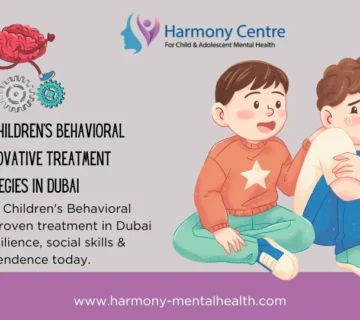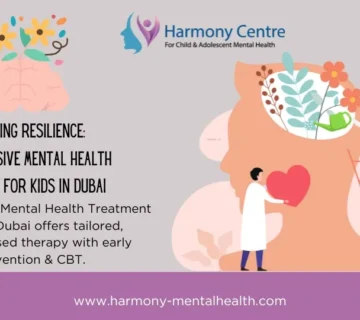Play Therapy Dubai: Transforming Child Mental Health Through Therapeutic Play at Harmony Centre
Discover play therapy in Dubai at Harmony Centre. Our evidence‑based approach uses therapeutic play to boost emotional, social, and cognitive growth in children.
Contact Information
| Contact Method | Details |
|---|---|
| Phone | +971 (52) 8773268 / 04 558 2015 |
| Click Here | |
| info@harmony-mentalhealth.com | |
| Address | Office 409, Building Alrazi-64C, 26th St, Healthcare City, Dubai |
Introduction
In the vibrant city of Dubai, where children face academic pressures, social challenges, and rapid urban change, innovative mental health interventions are essential. At Harmony Centre Mental Health Dubai, we leverage the transformative power of play therapy to help children express emotions, build resilience, and enhance overall well‑being. Play therapy uses fun, structured activities to encourage self‑expression and foster cognitive and social development. Our evidence‑based, multidisciplinary approach ensures that each child receives personalized care that nurtures growth in every aspect of life.
Learn More About Harmony Centre • Contact Us
What Is Play Therapy?
Defining Play Therapy
Play therapy is a form of psychotherapy that uses play as the primary medium for communication and healing. It enables children to express their feelings, explore experiences, and resolve internal conflicts through creative activities. Unlike traditional talk therapy, play therapy offers a non‑threatening, engaging environment that is especially effective for young children who may have difficulty verbalizing their thoughts.
Core Elements of Play Therapy
- Creative Expression:
Children use toys, games, and art to explore and communicate emotions. - Safe Environment:
A structured play setting provides a secure space where children feel free to express themselves. - Therapeutic Guidance:
Trained therapists facilitate sessions, guiding play activities and helping children process their experiences. - Non‑Verbal Communication:
Play serves as an alternative language, allowing children to convey feelings that they might not articulate with words.
How Play Therapy Works
Play therapy sessions typically involve activities such as role‑playing, drawing, storytelling, and interactive games. These activities enable therapists to observe behavior, identify emotional issues, and tailor interventions to the child’s specific needs. The goal is to help children develop healthier coping mechanisms, improve social skills, and gain self‑awareness.
The Benefits of Play Therapy for Child Mental Health
Enhancing Emotional Expression
Play therapy gives children an outlet to express complex feelings without relying solely on words.
- Emotional Release:
Engaging in creative play allows children to release pent‑up emotions in a controlled, supportive environment. - Improved Self‑Awareness:
As children explore their emotions through play, they develop a better understanding of themselves, which enhances emotional regulation.
Boosting Cognitive Development
Through play, children learn problem‑solving skills, critical thinking, and creativity.
- Interactive Learning:
Play activities encourage children to experiment, explore, and make decisions, which supports cognitive growth. - Memory and Focus:
Structured play sessions help improve concentration and memory, contributing to better academic performance.
Strengthening Social Skills
Group play therapy sessions foster social interactions that build communication and empathy.
- Peer Interaction:
In a group setting, children learn to share, cooperate, and resolve conflicts, enhancing their social competence. - Role‑Playing Exercises:
These activities provide opportunities for children to practice appropriate social responses and develop better interpersonal skills.
Building Resilience and Confidence
Play therapy helps children overcome challenges by gradually exposing them to stressful scenarios in a safe setting.
- Positive Reinforcement:
Therapists use praise and rewards to encourage progress, boosting self‑esteem and confidence. - Adaptive Coping Strategies:
Through guided play, children learn practical strategies to handle stress and adapt to changes in their environment.
Supporting Trauma Recovery
For children who have experienced trauma, play therapy offers a gentle way to process and heal from distressing events.
- Non‑Threatening Exploration:
Play allows children to revisit and reframe traumatic experiences in a secure, supportive context. - Gradual Desensitization:
Therapists guide children through incremental exposure to traumatic memories, helping them build coping skills over time.
How Harmony Centre Implements Play Therapy
Comprehensive Assessment and Personalized Planning
At Harmony Centre, we begin our play therapy process with a thorough assessment. Our multidisciplinary team gathers insights from parents, teachers, and direct observations to understand each child’s unique challenges and strengths.
Assessment Process
- Standardized Evaluations:
We use validated tools to assess emotional, cognitive, and behavioral functions. - Direct Observations:
Therapists observe children during play to capture natural behaviors and interactions. - Parental and Educator Feedback:
Interviews and questionnaires from parents and teachers provide additional context and help tailor the therapy.
These insights form the foundation for a personalized play therapy plan that addresses specific needs and sets measurable goals.
Personalized Play Therapy Sessions
Individual Play Therapy
One‑on‑one sessions provide a safe, confidential space for children to explore their emotions through play.
- Customized Interventions:
Therapists select activities based on the child’s interests and therapeutic goals, such as drawing, role‑playing, or building with blocks. - Focused Exploration:
Individual sessions help children delve into personal challenges and develop targeted coping strategies.
Group Play Therapy
Group sessions offer the added benefit of peer support and social interaction.
- Collaborative Activities:
Children participate in shared games and projects that encourage teamwork and enhance communication skills. - Social Skill Development:
Interactive play helps children learn to navigate social situations, build empathy, and form meaningful connections.
Family-Inclusive Play Therapy
Involving the entire family in play therapy can improve communication and strengthen bonds.
- Shared Creative Sessions:
Family sessions involve joint activities that promote understanding and collaboration. - Reinforcement at Home:
These sessions help families adopt play-based strategies that reinforce therapeutic gains in everyday life.
Learn More About Our Play Therapy Services
Contact Harmony Centre
Evidence‑Based Outcomes of Play Therapy
Quantitative Benefits
Our data‑driven approach shows significant improvements in:
- Emotional Regulation:
Children often experience a 30–40% reduction in symptoms of anxiety and stress after regular play therapy. - Social Skills:
Group sessions lead to measurable improvements in communication and peer interactions. - Academic Performance:
Enhanced focus and reduced behavioral issues contribute to better academic outcomes.
Qualitative Benefits
Play therapy also yields profound, qualitative changes:
- Increased Self‑Expression:
Children gain the confidence to express their feelings and thoughts creatively. - Enhanced Resilience:
Through play, children learn adaptive coping strategies that help them handle stress and adversity. - Stronger Family Bonds:
Family-inclusive sessions promote deeper connections and improved communication among family members.
“Since starting play therapy at Harmony Centre, my daughter has become much more expressive and confident. She now uses art and play to communicate her feelings.”
– Parent Testimonial
“The group play therapy sessions have been a turning point for my son. He has built stronger friendships and learned to manage his emotions better.”
– Parent Testimonial
For further insights into the research behind play therapy, please refer to the American Psychological Association (external link).
Practical Strategies for Embracing Play Therapy at Home
For Families
Create a Conducive Creative Space
- Dedicated Art Corner:
Set up a space at home stocked with art supplies and comfortable seating for creative expression. - Regular Playtime:
Incorporate daily or weekly play sessions that encourage free expression and fun, non-structured play.
Encourage Open Dialogue Through Play
- Discuss Art Creations:
Engage your child in discussions about their drawings or crafts, asking open‑ended questions to explore their feelings. - Family Play Projects:
Work on creative projects together, such as building a model or composing a simple song, to strengthen bonds and encourage teamwork.
Utilize Digital Tools
- Telehealth Sessions:
Use Harmony Centre’s telehealth services for virtual play therapy consultations, ensuring continuous support even when in-person visits are challenging. - Interactive Apps:
Leverage educational apps that promote creative play and emotional expression through guided activities.
For Educators
Integrate Play into Learning
- Structured Playtime:
Incorporate play-based activities in the classroom to help children explore emotions and build social skills. - Group Projects:
Organize collaborative art or play projects that encourage students to work together and express themselves creatively.
Foster a Supportive Classroom Environment
- Designated Play Areas:
Create spaces where students can engage in creative play and quiet reflection. - Regular Check‑Ins:
Encourage teachers to monitor and discuss students’ creative activities, reinforcing the connection between play and learning.
For the Community
Engage in Community Workshops
- Local Art and Play Sessions:
Attend community workshops that focus on creative expression and mental health. These events offer practical tools and foster social connections among families. - Support Groups:
Join parent support groups that discuss the benefits of play therapy and share experiences for mutual support.
Utilize Online Resources
- Digital Platforms:
Access online resources and telehealth services provided by Harmony Centre to enhance your understanding and practice of play therapy. - Community Forums:
Participate in online discussions with other parents and educators to exchange tips and strategies for effective play therapy.
Explore Our Community Initiatives
Contact Harmony Centre
Contact Information
Office Address:
Office 409, Building Alrazi-64C, 26th St, Umm Hurair 2, Dubai Healthcare City, Dubai
Phone:
+971 4 558 2015
+971 5 287 73268
Email:
info@harmony-mentalhealth.com
Final Thoughts about Play Therapy Dubai
Play therapy offers a creative, effective way for children to express, heal, and grow. At Harmony Centre Mental Health Dubai, our evidence‑based, integrated approach harnesses the power of play to enhance emotional, cognitive, and social development. Through personalized therapy sessions and continuous support, we help children overcome challenges and unlock their full potential.
Invest in your child’s future with play therapy that not only addresses immediate mental health needs but also builds the resilience necessary for lifelong success. Embrace the transformative power of creative expression and watch your child thrive.
Learn More About Harmony Centre
Get in Touch
👉 Book a Consultation Now: Call +971 4 558 2015 or visit www.harmony-mentalhealth.com.
Join our online community and stay updated with our latest events, articles about Play Therapy Dubai



